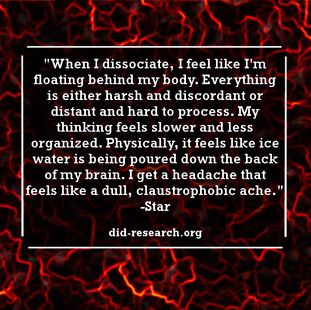.
“As an undergraduate student in psychology, I was taught that multiple personalities were a very rare and bizarre disorder. That is all that I was taught on ... It soon became apparent that what I had been taught was simply not true. Not only was I meeting people with multiplicity; these individuals entering my life were normal human beings with much to offer. They were simply people who had endured more than their share of pain in this life and were struggling to make sense of it.”
― Deborah Bray Haddock, The Dissociative Identity Disorder Sourcebook
Dissociative Disorders
According to the DSM-5, "dissociative disorders are characterized by a disruption of and/or discontinuity in the normal integration of consciousness, memory, emotion, perception, body representation, motor control, and behavior" (American Psychiatric Association, 2013).1
The DSM-5 contains the following dissociative disorders:
- Dissociative identity disorder
- Dissociative amnesia
- Depersonalization/derealization disorder
- Other specified dissociative disorder
- Unspecified dissociative disorder
Positive symptoms of dissociation are experienced as "unbidden intrusions into awareness and behavior, with accompanying losses of continuity in subjective experience." Examples include the subjective sense that one contains multiple states of self ("fragmentation of identity"), the sense that one isn't real ("depersonalization"), and the sense that the world around oneself isn't real ("derealization")(American Psychiatric Association, 2013).1
Negative symptoms of dissociation are experienced as an "inability to access information or to control mental functions that normally are readily amenable to access or control." Examples include amnesia (American Psychiatric Association, 2013).1
Dissociative symptoms are often present after traumatic situations, and posttraumatic stress disorder and other trauma-and-stressor-related disorders often contain dissociative features (American Psychiatric Association, 2013).1 Other disorders that can include or cause dissociative experiences include borderline personality disorder (American Psychiatric Association, 2013)1, anxiety disorders, mood disorders, schizophrenia (Mula, Pini, & Cassano, 2007),2 eating disorders, obsessive-compulsive disorder, and trichotillomania (hair-pulling disorder), especially in individuals who experienced childhood trauma (Lochner et al., 2004)3 or who have more severe symptoms. Dissociation is also associated with migraines and epilepsy (Mula, Pini, & Cassano, 2007).2
1 American Psychiatric Association. (2013). Dissociative Disorders. In Diagnostic and statistical manual of mental disorders (5th ed.). http://dx.doi.org/10.1176/appi.books.9780890425596.dsm08
2 Mula, M., Pini, S., & Cassano, G. B. (2007). The neurobiology and clinical significance of depersonalization in mood and anxiety disorders: A critical reappraisal. Journal of Affective Disorders, 99(1-3), 91-9. doi: 10.1016/j.jad.2006.08.025
3 Lochner, C., Seedat, S., Hemmings, S. M. J., Kinnear, C., J., Corfield., V. A., Niehaus, D. J. H., ... Stein, D. J. (2004). Dissociative experiences in obsessive-compulsive disorder and trichotillomania: Clinical and genetic findings [Abstract]. Comprehensive Psychiatry, 45(5), 384-391. doi: 10.1016/j.comppsych.2004.03.010

